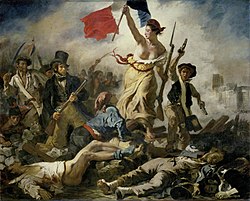| Part of a series on |
| Political revolution |
|---|
 |
|
|
In political science, a revolution (Latin: revolutio, 'a turn around') is a rapid, fundamental transformation of a society's class, state, ethnic or religious structures.[1] According to sociologist Jack Goldstone, all revolutions contain "a common set of elements at their core: (a) efforts to change the political regime that draw on a competing vision (or visions) of a just order, (b) a notable degree of informal or formal mass mobilization, and (c) efforts to force change through noninstitutionalized actions such as mass demonstrations, protests, strikes, or violence."[2]
Revolutions have occurred throughout human history and varied in their methods, durations and outcomes.[3] Some revolutions started with peasant uprisings or guerrilla warfare on the periphery of a country; others started with urban insurrection aimed at seizing the country's capital city.[2] Revolutions can be inspired by the rising popularity of certain political ideologies, moral principles, or models of governance such as nationalism, republicanism, egalitarianism, self-determination, human rights, democracy, liberalism, fascism, or socialism.[4] A regime may become vulnerable to revolution due to a recent military defeat, or economic chaos, or an affront to national pride and identity, or pervasive repression and corruption.[2] Revolutions typically trigger counter-revolutions which seek to halt revolutionary momentum, or to reverse the course of an ongoing revolutionary transformation.[5]
Notable revolutions in recent centuries include the American Revolution (1775–1783), French Revolution (1789–1799), Haitian Revolution (1791–1804), Spanish American wars of independence (1808–1826), Revolutions of 1848 in Europe, Mexican Revolution (1910–1920), Xinhai Revolution in China in 1911, Revolutions of 1917–1923 in Europe (including the Russian Revolution and German Revolution), Chinese Communist Revolution (1927–1949), decolonization of Africa (mid-1950s to 1975), Cuban Revolution in 1959, Iranian Revolution and Nicaraguan Revolution in 1979, worldwide Revolutions of 1989, and Arab Spring in the early 2010s.
- ^ Skocpol, Theda (1979). States and Social Revolutions: A Comparative Analysis of France, Russia and China. Cambridge University Press. doi:10.1017/cbo9780511815805. ISBN 978-0-521-22439-0.
- ^ a b c Goldstone, Jack (2001). "Towards a Fourth Generation of Revolutionary Theory". Annual Review of Political Science. 4: 139–187. doi:10.1146/annurev.polisci.4.1.139.
- ^ Stone, Lawrence (1966). "Theories of Revolution". World Politics. 18 (2): 159–176. doi:10.2307/2009694. ISSN 1086-3338. JSTOR 2009694. S2CID 154757362.
- ^ Gunitsky 2018; Gunitsky 2017; Gunitsky 2021; Reus-Smit 2013; Fukuyama 1992; Getachew 2019
- ^ Clarke, Killian (2023). "Revolutionary Violence and Counterrevolution". American Political Science Review. 117 (4): 1344–1360. doi:10.1017/S0003055422001174. ISSN 0003-0554. S2CID 254907991.